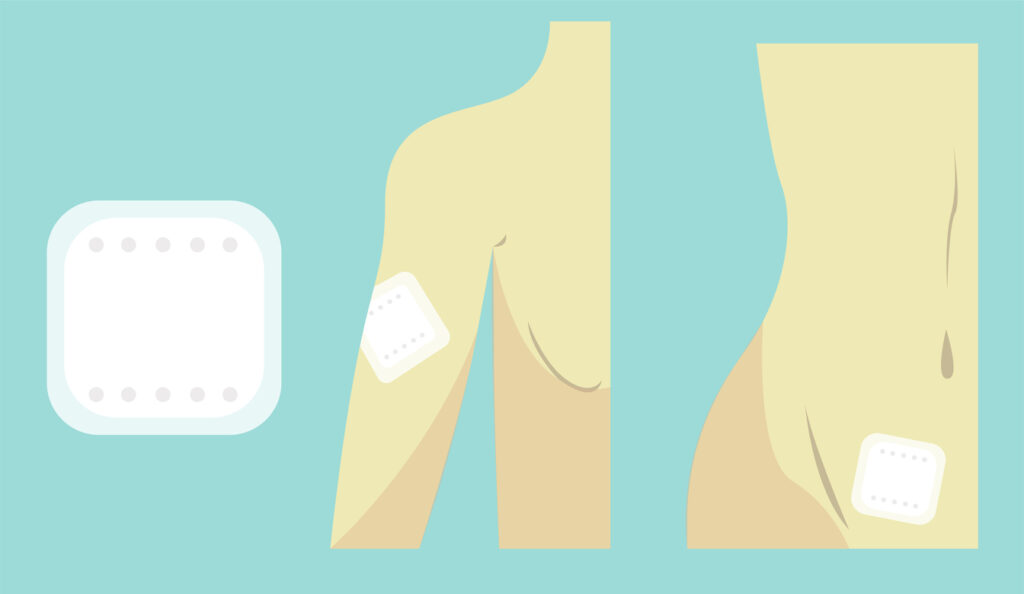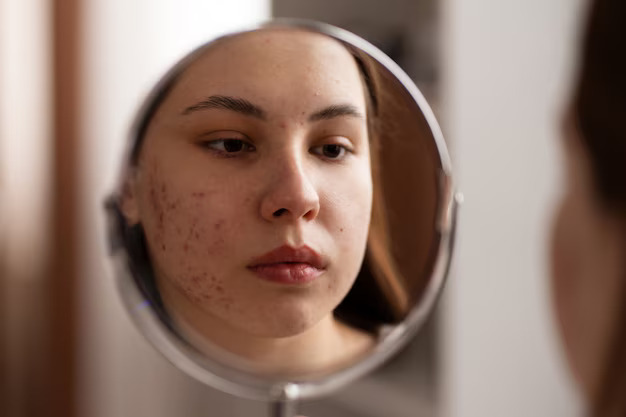Polycystic ovary syndrome, or PCOS, are prevalent and affects 8-13% of reproductive-aged women, with 70% of women with polycystic ovary syndrome remaining undiagnosed worldwide.
PCOS in women can cause a hormonal imbalance, excess androgen levels, irregular periods and problems like acne or excess facial hair growth. These effects can directly impact a woman’s health, particularly fertility. PCOS symptoms may start around adolescence and fluctuate over time.
Polycystic ovary syndrome (PCOS) is a chronic condition that cannot be cured. However, certain lifestyle changes, medications and treatments can ease PCOS symptoms.
Have you heard of birth control for PCOS? Yes, birth control or contraceptives can be used as a treatment option for PCOS. In this blog, Dr. Michelle Chia, Medical Director of Ezra Clinic, will explore how birth control can aid in managing symptoms of PCOS.
What is Polycystic Ovary Syndrome or PCOS?
Polycystic ovarian syndrome affects the way ovaries work. The formation of multiple follicles in the ovaries leads to its “polycystic appearance”. This hinders ovulation, which can lead to irregular periods and infertility.
PCOS can lead to irregular periods, weight gain, fertility issues, and hormonal imbalance. Its cause is unknown; however, several factors contribute to its development. These factors include abnormal hormone levels, insulin resistance, genetic predisposition, lifestyle choices, and family history. It also includes elevated androgen levels – male hormones that are supposed to be at lower levels in women.
Challenges of Having PCOS

Due to the hormonal imbalance, women with PCOS face challenges due to its symptoms. Symptoms of PCOS vary between individuals. It may change from time to time and occur without a clean trigger. PCOS symptoms include:
Irregular menstrual periods
Excess body hair (hirsutism)
Acne
Hair loss (alopecia)
Fertility issues
Stress
Body weight problems
Difficulty with weight loss
Significant weight gain
Sleep problems
How Does Birth Control Treat Polycystic Ovarian Syndrome (PCOS)?
Hormonal birth control can manage PCOS. It contains both estrogen and progestin hormones that rebalance and alleviate symptoms of PCOS. These hormones regulate menstrual cycles by introducing consistent levels of hormones into the body. Regularisation of the menstrual cycle improves fertility and reduces the endometrial cancer risk. Oral contraceptive pill has also been shown to reduce the risk of ovarian cancer.
Birth control can also reduce androgen levels, which contribute to acne and excess hair growth. Improvement in acne and a reduction in unwanted hair growth also enhance the individual’s self-esteem and psychological well-being.
On top of that, birth control pills can also help to prevent pregnancy if you are not intending to conceive.
Types of Birth Control Suitable for PCOS:
Hormonal birth control manages PCOS, and there are several types of them, including combination birth control pills or patches.
Birth Control Pills

Birth control pills or oral contraceptive pills contain both estrogen and progestin and can help reduce androgens which are the male sex hormones. Combination birth control pills are often prescribed to women with polycystic ovary syndrome, as they help restore a regular menstrual cycle.
A birth control pill is usually taken once a day for 21 days, followed by a seven-day break or placebo pills. The estrogen in hormonal birth control pills regulates the menstrual cycle, while progestin helps reduce male hormone levels and regulate ovulation. When taken consistently, these oral contraceptives can improve symptoms of PCOS, such as irregular periods, acne and excessive hair growth.
Patches

Birth control patches contain the same hormones as combination pills, but they are applied directly onto the skin. The skin patch is placed on a clean, dry area of skin and replaced every week for three weeks, followed by a one-week break. Like combined oral birth control pills, the patch regulates menstrual cycles as well via estrogen and progestin hormones.
Patches are an excellent option for women who struggle with remembering to take a pill every day, as they only need to remember to change the patch once a week.
What Birth Control Is Right For Me?
Choosing the right birth control to manage PCOS symptoms is highly personal and varies significantly from one individual to another. It’s essential to consider several factors, such as age, health history, and lifestyle, when selecting the most suitable birth control method for managing PCOS.
For younger women, especially those not planning on starting a family soon, combination birth control pills might offer the dual benefits of regulating menstrual cycles and reducing symptoms like acne.
However, for women with a more sedentary lifestyle or those prone to forgetfulness, long-acting options such as birth control patch could provide a convenient and efficient solution, eliminating the need for daily reminders.
Each woman’s body responds differently to hormonal birth control, making the consultation with a healthcare professional crucial. Engaging with a healthcare provider allows for a thorough examination of individual health profiles, including pre-existing conditions, lifestyle choices, and family health history.
This personalised approach ensures that any selected birth control method not only addresses the management of PCOS symptoms but also aligns with overall health goals and minimizes potential side effects. Remember, what works for one person may not work for another, highlighting the importance of tailored healthcare plans in achieving optimal health outcomes for individuals with PCOS.
Risks and Side Effects of PCOS
While birth control serves as an effective means of managing PCOS symptoms, it is important to consider and acknowledge the potential side effects and risk factors associated with this condition.
Diabetes
Studies have shown that women with PCOS have a higher risk of developing type 2 diabetes. It is because women with PCOS have insulin resistance, meaning their bodies can make insulin but can’t use it effectively – increasing the risk of type 2 diabetes.
Weight gain
Losing weight is challenging for women with PCOS due to hormonal imbalances. Women with PCOS also tend to be overweight, which puts them at higher risk of other conditions like high blood pressure, blood clots or inflammatory and coagulatory disorders.
Cardiovascular issues
There is a small increased risk of developing cardiovascular issues, such as blood clots and stroke, with the use of hormonal birth control. This risk is higher for women over the age of 35 who smoke or have a history of cardiovascular disease in their family. It’s crucial to discuss any pre-existing conditions and lifestyle choices with a healthcare provider before starting any form of hormonal birth control.
Managing the side effects of birth control requires lifestyle adjustments and open communication with healthcare professionals. Doing regular physical activity and adopting a balanced diet can help mitigate potential side effects such as weight gain and insulin resistance. It’s also critical to monitor any changes in mood or well-being, as hormonal birth control can affect mental health in some individuals.
Considering Future Plans:
Birth control can serve as both a short-term solution and part of a long-term strategy for managing PCOS symptoms. In the short term, it offers immediate relief from symptoms such as irregular periods, acne, and hirsutism, allowing individuals to regain control over their body and lifestyle quickly. For those looking at long-term management, consistent use of birth control helps regulate menstrual cycles, reduce endometrial cancer risk, and manage hormone levels over time.
For individuals planning to get pregnant in the future, the choice of birth control method and the duration of its use require careful consideration. It’s essential to discuss family planning with a healthcare provider. Transitioning off hormonal birth control to conceive may require a period of adjustment, as the body needs time to resume its natural ovulation cycle. The best birth control method suitable for you should be discussed with your doctor.
Conclusion
Birth control is a treatment option for PCOS that regulates menstrual cycles, reducing male hormone levels and addressing issues like acne and excess hair growth. With several options available, including combination pills or patches, the choice of birth control should be based on individual health profiles, lifestyle, and future fertility plans.
Acknowledge the potential side effects associated in polycystic ovarian syndrome women, such as the increased risk of type 2 diabetes, weight gain, and cardiovascular issues, and adopt lifestyle measures to mitigate these risks.
Do not forget to engage with a healthcare professional in navigating the complexities of PCOS and selecting the best birth control method. This personalised healthcare plan aims to manage PCOS symptoms effectively and aligns with the individual’s overall health and well-being goals, ensuring that the chosen method complements their lifestyle and minimises potential side effects.








